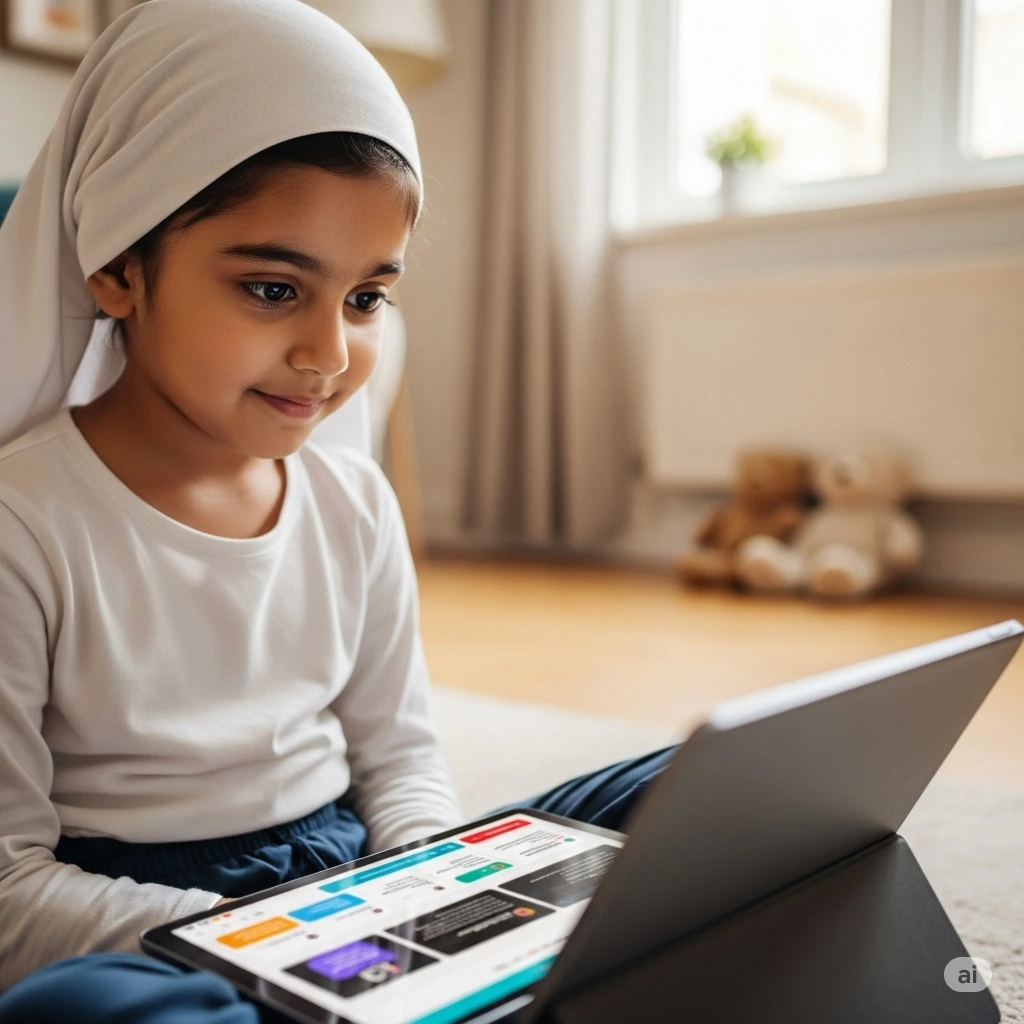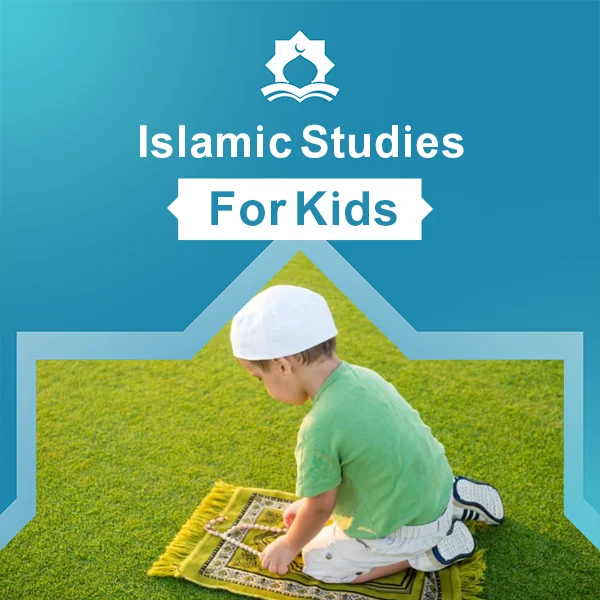Teaching Islamic studies for kids helps develop strong faith and character. Through storytelling, visual aids, and hands-on activities, kids learn about the Quran, Sunnah, and the Five Pillars of Islam.

What Are Islamic Studies for Kids?
Islamic Studies for Kids is the structured way we introduce Islam to young learners.
It begins with the Qur’an and the Sunnah of Prophet Muhammad (peace be upon him) and develops into a full framework of belief, worship, and character.
At its heart, it helps children know Allah, love the Prophet, and anchor their identity in Islam.
Because children are not yet responsible for all religious duties, Islamic Studies for Kids starts with familiarity and love—especially the Five Pillars of Islam (Shahadah, Salah, Zakat, Sawm, Hajj)—so that when obligations arrive, practice feels natural and meaningful.
What Makes The greatness of Islam, its importance, and why one should be proud to be a Muslim and eager to learn about Islamic studies for kids
Islamic studies for kids is a captivating religion with a deep history and This highlights how essential Islam is for Muslims, not just as a belief but as a framework for living a meaningful, purposeful, and balanced life. It is important because it connects a person to their Creator and provides clear guidance for both this world and the Hereafter.
This part emphasizes the honor and dignity of being a follower of Islam, a faith chosen by Allah. Muslims can take pride in the values of Islam, its history, its moral principles, and the example of Prophet Muhammad (peace be upon him).
Eager to learn about the religion means that a Muslim should feel motivated and excited to gain knowledge about their faith, to understand it deeply, and to practice it correctly. Learning about Islam strengthens one’s faith and brings inner peace.
Learn more about: Online Quran Classes with Tajweed for All Ages | Learn Fast
Why Teaching Islamic Studies for Kids Early Matters
Children need moral direction and a clear sense of right and wrong. Age-appropriate Islamic studies for kids helps them:
- Understand their faith and values.
- Develop kindness, honesty, and respect.
- Build a confident Muslim identity.
Many parents recall being taught complex topics too early—and feeling confused. We design our curriculum so each stage matches a child’s readiness, reducing overwhelm and strengthening long-term understanding.
Core Subjects in the topquranclasses
Below are the major subject areas we cover across grade levels. Depth and method vary by age, but the spiritual goals remain constant.
- Islamic Jurisprudence (Fiqh)
Practical guidance on worship and daily living: the Five Pillars, family relations, Islamic manners, and personal purification (taharah).
- Islamic Creed (Aqidah)
Answers life’s big questions—Who is Allah? Where are the angels? What happens at the end of time?—through authentic teaching on belief in Allah, angels, revealed books, prophets, the Last Day, and divine decree (qadar).
- Spiritual Growth (Tazkiyah)
Nurturing the heart through dhikr, dua’, gratitude, patience, and other practices drawn from Qur’an and Sunnah that help children guard their inner world.
- Hadith
Selected, child-friendly narrations that reinforce truthfulness, kindness, respect, and love for the Prophet ﷺ—linked to real-life behavior.
- Prophetic Biography (Seerah)
Real heroes, real lessons. Students explore the life of the Prophet Muhammad (peace be upon him)—before and after revelation—including the Hijrah to Madinah and Al-Isra’ wa Al-Mi’raj, drawing role‑model lessons for today.
- Qur’an Studies
- Tajweed & Recitation: Correct pronunciation and reading skills.
- Memorization (Hifz): Gradual, supported memorization plans that strengthen memory, discipline, and connection to Allah.
- Understanding & Tafsir Foundations: Guided meaning of verses using age-appropriate explanations and supporting ayat.
- Islamic Ethics & Character
Raising good Muslims means raising good people. Lessons on compassion, service, responsibility, and caring for others help faith translate into action.

How We Teach islamic studies for kids (Methods That Work)
- Age-Responsive Pathways
Concepts, vocabulary, and expectations scale with learners’ developmental stages.
- Integrated Arabic Instruction
Kids gain key Islamic terms, alphabet, pronunciation, and starter grammar—supporting Qur’an reading and cultural literacy.
- Interactive Teacher–Student Discussions
Instructors open every class with questions, check prior knowledge, and guide conversation—building trust and clarity.
- Certified Mentor-Teachers
Our teachers do more than lecture; they mentor, motivate, and model Islamic behavior.
- Storytelling That Sticks
Islamic history is taught like a compelling story so students remember the lessons.
- Visuals, Media & Games
Slides, short videos, and interactive activities help screen-native kids stay engaged.
- Practice + Theory
Students perform what they learn—wudu’, salah basics, fasting awareness, dhikr, and good manners—so knowledge becomes habit. Homeschool-friendly tracks include home practice checklists.
Fit with topquranclasses
Our Islamic studies for kids program integrates smoothly with academic subjects:
- History & Social Studies
Prophetic timelines, early Muslim communities, world civilizations.
- Language & Literacy
Reading passages, storytelling, vocabulary building in English and Arabic.
- Character/SEL
Decision-making, empathy, and community responsibility.
- Critical Thinking
Comparing sources, understanding cause & effect, and applying values to real scenarios.
Whether full-time online, after-school, weekend, or homeschool support—we scale to your child’s schedule.
Is islamic studies for kids Right for Your Child?
Yes—especially in the formative years. Even before formal obligations begin, children can learn the language, stories, and values of Islam so they’re ready to practice joyfully when the time comes.
Essential Foundations: The Five Pillars
Before religious duties become required, children benefit from gentle exposure to the Five Pillars—Shahadah, Salah, Zakat, Sawm (fasting in Ramadan), and Hajj—so practice later feels natural and meaningful.

Suitability for our Learners
Children are not fully obligated in worship at young ages, but learning early builds readiness and love. For example, prayer becomes required later, yet learning “how” well before age seven helps lifelong practice. Our program scales content from early childhood through the ten years so understanding deepens as responsibility grows.
Tips for Teaching Islamic Studies to Kids at Home or in Schools
Teaching Islamic studies for kids, whether at home or in school, can be challenging but is essential for their spiritual and moral upbringing. By following these tips, parents and educators can create an engaging and supportive learning environment.
- Create a Positive Learning Environment
A welcoming and distraction-free space is key to effective learning. Parents and teachers should maintain patience, kindness, and understanding while teaching, ensuring children feel encouraged and supported.
- Make Learning Interactive and Fun
To capture children’s interest, incorporate interactive methods such as storytelling, games, visual aids, and role-playing. These techniques help simplify complex concepts and make learning enjoyable. Encouraging discussions and welcoming questions also nurture critical thinking and deeper understanding.
- Build Faith and Values
Islamic studies help children connect with their faith, history, and culture. Teaching them about Islamic beliefs, values, traditions, and practices instills strong moral foundations and guides them to become responsible and respectful individuals.
Discover: Best Online Quran Classes: What should it include?
Ready to Begin?
Help your child build unshakable faith, sound knowledge, and beautiful character—step by step, grade by grade.
Enroll in topquranclasses’s Online Islamic Studies today.
Book a placement or trial lesson.
Meet our certified teachers.
Explore Qur’an, Arabic, and Islamic Studies tracks that grow with your child.
Education made easy—anytime, anywhere. Join us now.
FAQS
At what age should children start learning Islamic studies?
There isn’t a fixed age to begin learning Islamic studies, but it’s best to introduce the subject as early as possible. Many Islamic programs start with children as young as three years old.
Do I need to be Muslim to teach Islamic studies to my children?
No, you don’t need to be Muslim to teach Islamic studies. However, having a basic understanding of Islamic principles and teachings is essential to guide children effectively.
Is enrolling my kids in an Islamic school necessary for them to learn Islamic studies?
Not at all. You can teach Islamic studies at home using books, online courses, and other educational resources designed for children.
How can I make Islamic studies interesting for my kids?
Make learning interactive by incorporating games, stories, role-playing, and hands-on activities. Visiting museums, historical landmarks, and cultural sites related to Islam can also bring lessons to life.

